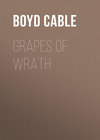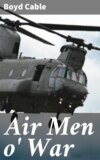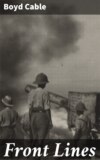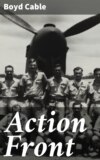Buch lesen: «By Blow and Kiss», Seite 7
CHAPTER IX
“How’s the woman, mavourneen?” asked Trooper Dan.
“She’s clean crazy, I think,” said his wife. “She sits there moaning an’ wringing her hands, an’ not a word out o’ her but ‘He’s dead – he’s dead.’ She was screaming crying a while, then laughing to herself, then crying again, then over an’ over ‘He’s dead – he’s killed.’”
“Killed,” repeated the trooper, thoughtfully. “She said he was killed, but not a word who killed him. Ah, well, there’s divil a doubt, I’m feared, who ’twas did it. They’d been quarrellin’ an’ tearin’ their throats out, an’ he’d swore he’d kill him…”
“Who swore?” interrupted his wife.
“Who but Steve Knight?” said Dan, sadly. “An’ he shlipped away from the rest – but I mustn’t be sthandin’ talkin’ here. He bate me an’ got away on his horse, an’ he’ll be off t’ the hills, an’ I must take after him. I’ll go get me ridin’ things on. I must be out o’ here in fifteen minutes.”
Mrs. Mulcahy watched him go, and then tiptoed softly across the room to the clock, and put the hands back a good seven or eight minutes.
“Five minutes on a good horse makes a world o’ difference sometimes,” she said to herself, and went back to the woman, who sat twisting her fingers together and shaking her head and moaning with an empty look in her eyes.
“You’ve been quick,” she said to Trooper Dan, as he came out buttoning his tunic. “Quarter past when you said you’d go in fifteen minutes, and I thought I’d have time to get you a bite o’ breakfast. You might have time for that inside your fifteen minutes yet, though.”
Dan looked at the clock and then sharply at her, but she was busying herself with the kettle with a face as innocent as a child’s.
“Get yourself the bread an’ the butter,” she said. “I’ll have the tea made, and there’s a slice o’ bacon in the pan.”
“There’s hardly time for that,” he said doubtfully.
“Time – nonsense. You’ll ride the harder an’ the stronger for some food. It’s a terrible hurry yeare in to be after poor Stevie.”
“Aye, though, if I’d my own way … d’you think it’s pleasure I’m takin’ – you an’ yer poor Stevie?” he finished irritably. “I’ll go’n get my saddle on an’ swallow a bite when I’m back.”
“Dan dear,” said his wife, softly, “I didn’t mean that, an’ you know it. It’s me that knows you hate huntin’ the lad as much as I hate you doin’ it.”
“If I was a good policeman, I wouldn’t hate me job,” said Dan, and “I’d rather a good man than a good policeman any day,” said his wife, and kissed him.
When he had gone she hesitated a moment, and then went and put the clock back another few minutes. When Dan came back his breakfast was on the table, and when he wanted to stand and drink his tea and take some bread and bacon in his pocket, she would not hear of it, and made him sit down.
“Get me the cartridges from the office,” he said.
“An’ ye might load the two chambers I fired.” She brought the cartridges and broke open the revolver and extracted the empty shells. Her fingers moved slowly, and then stopped. “I heard you shoot,” she said. “You missed him?”
“I missed him,” he said, “be yards.”
“How could ye know it was by yards?” she asked.
“How should I not know?” he answered, with his mouth full. “Me that took the Constable’s Cup an’ can hit a runnin’ rabbit at – well, well, never mind that,” he finished hastily.
A smile was playing about her face, and she picked out the two cartridges. “You missed before,” she said, with her fingers still again. “But, Danny dear, suppose – you might meet him – it might be him or you – you’d have to…” She twisted the things. “I just don’t like to do it, Dan,” she said suddenly. “I know you might have to, but I’d never have peace after, to think ’twas me loaded the gun that did it. You might shoot him, Dan, an’…”
“Shoot him? ’Course I’ll shoot ’im first chance I get,” he said, with mock ferocity. “I’ll shoot ’im full o’ holes as yer kitchen colander. Don’t I owe him wan for the kiss I saw him give you before me very eyes?”
“You saw that?” she said defiantly. “An’ you might have seen the one I gave him back. Ye owe him one for that, Danny, an’ of course you owe him nothin’ for ridin’ fifty mile through the rains an’ swimmin’ the Staked Crossin’ in a ragin’ flood to bring the doctor to poor little Danny, that wouldn’t be with us now but for him.”
“Be quiet, woman,” said Dan, fiercely. “Is it wi’ that in my heart ye’d send me out to meet a man I may have to shoot or be shot by? ’Tis a nice choice, too.”
He finished his breakfast and stood up. “Ye’ll stay by the woman an’ watch her careful,” he said. “Will ye manage that all right? Keep her to her bed, or make her lie down on the sofy. She can’t well go back to her home while he’s bein’ got ready. She’s crazy enough now, poor thing.”
“Her child was to be born in a month or so, Dan,” she said, with tears trembling in her eyes. “She might never get her senses back after a shock like that at such a time.”
“I’ll telegraph to the doctor when I go,” he said, “an’ I must be wirin’ to headquarters. They’ll likely be sending a sergeant and another man or two to help fetch him in.”
“I can get one of the neighbours in to help me if need be,” she said. “Maybe I’d better get Mrs. Wilson now.”
“Maybe ye had,” he said hesitatingly. “An’ you must listen careful what Mistress Durgan says – an’ if she mentions Ste – , any name, you ought to write it down, maybe. It might be if she didn’t pull through that you’d have to go in the witness box and swear to who she said it was did it.”
“Me swear Steve Knight’s neck into a noose!” she said. “It’s likely now, isn’t it?”
“They’d make ye go in the box,” he said. “An’ they’d make me say if I warned ye to write down anything she said, an’ me bein’ a constable an’ knowin’, ye see…”
“I see, Dan,” she said. “I’ll write down everything, never fear. You can swear you told me to. I’ll write now what she’s said.” She sprang up and got a piece of paper and pencil. “‘He’s dead’ an’ ‘he’s killed,’ that’s all she’s said till now.”
“Are ye sure – about the ‘killed,’ mavourneen?” he said slowly. “It doesn’t mean just the same…”
“Of course not,” she said hastily, and tore the paper to little shreds. “I never heard such a word. Whatever did you put that in my head for?”
“It just shows the need of writin’ things down,” he said severely. “An’ if Mrs. Wilson’s by when she says anything, ye needn’t mention to her about writin’ down. Just slip away an’…”
“I’ll not get Mrs. Wilson,” said his wife, quickly. “There’s not a soul will come nigh or near her till the doctor comes. An’ who can say there’s anyone better fitted to nurse a sick woman an’ take her evidence down than the constable’s wife?”
“’Tis yersilf that’s the treasure, jewell o’ me heart,” said Trooper Dan, kissing her warmly. “An’ who knows but that atween us – but it’s black enough an’ clear enough the case looks, widout any swearin’ from you or me, I doubt, I doubt.”
He went out, and Mrs. Mulcahy went softly into the bedroom where the woman lay, moaning and twisting her fingers and plucking at the coverlet. “He’s dead,” she whispered.
“Hush, dearie,” said Mrs. Mulcahy, soothingly. “Lie still and forget everything. Think only on the baby that’s comin’.” “He’s dead – he’s killed, killed, killed.” Mrs. Dan Mulcahy hushed her again and laid gentle fingers on her lips. Then she went and fetched a slip of paper and the pencil. “I ought to write it down,” she said, and wrote carefully “He is dead. He is dead, dead, dead.” She looked at the writing a moment and then thoughtfully crossed it out. “The baby is dead, dead, dead,” she wrote again. “It was the baby we were talking about. She must be clean crazed, for how could she say the baby was dead? Any court would see that,” and Mrs. Trooper Dan Mulcahy carefully folded the paper and slipped it in her bodice.
Up and down the track across the hills a string of men clambered and bumped and pounded, the stones rattling under the horses’ hoofs and the sand whirling behind them.
Some of the men rode swaying in the saddle, and some with drowsy heads hanging, but Aleck Gault and Whip Thompson sat with their shoulders hunched and their heads crouched forward, and keen eyes set on the difficult track. They plunged down the stony dips, the horses at times sitting back almost on their haunches, and sliding down with the loose rocks and dirt rolling and cascading around them; they drove headlong across the patches of open, picking their way amongst the rabbit burrows and paddy-melon holes without checking their stride; they spurred up the rises, the horses’ heads outstretched and their sides heaving, swept over the crests, and went swooping down the hills again. Far behind them came Darby the Bull, his simple mind in a whirl of dismay and anger with himself. He couldn’t rightly understand what it was all about, or how he had said anything that betrayed Steve, but Whip and the others had assured him with vituperative emphasis that he had “blown the whole show,” had laid the hounds straight on the scent, had given Trooper Dan no choice of thought or action but against Steve Knight. Darby the Bull couldn’t understand all this, but he could understand the simple fact that his mates were riding to help Steve and to defeat the police, and that his (Darby’s) help might be useful and his bull strength most acceptable. So Darby pounded along over rock and ridge and hollow, his heels banging his horse’s flanks and his knees gripped tight to the saddle. It seemed to him that it was madness to be galloping the horses this way, besides being cruel to them. But Aleck Gault and Whip were ahead of him, and they had told him to keep up if he could. That was plain enough, and any man could understand. All he had to do was follow and keep as near as his horse would take him; so he wrenched the brute’s head up when he stumbled and flung himself recklessly down the steep drops. He lost sight of them when they dived into the Axe-Cut – the steep bit of track that drove straight into the face of the “Wall-of-a-House” cliff, and made a narrow gorge, which offered the only way up the cliff for three or four hours’ ride round either way.
When Darby got to the top of the Axe-Cut a loud coo-ee made him look round, and he saw Gault and Whip Thompson hard at work lifting rocks and carrying them to the edge of the gorge and piling them in a heap there. He swung his horse round and joined them, and Whip called to him to hurry up and put his back into it. Darby didn’t trouble to ask questions, but merely set himself to lift and carry the biggest rocks he could move. One by one the other men joined them, and as soon as the last man was through Gault set them to rolling the stones over. There was a drop of about thirty to forty feet down to the path at the spot they had chosen, and although some of the boulders they flung over smashed to fragments, they gradually piled up till they formed a barrier utterly impassable to a horse and difficult to a footman.
“That’ll do, boys, I reckon,” said Aleck Gault at last, and Darby the Bull sat down and mopped his streaming brow.
“What’s the notion?” he asked, with a puzzled frown. “We’ll never be able to take the short cut to the township till we’ve shifted that. An’ there’s no other way for miles roun’.”
“We won’t be able to ride down, and Trooper Dan Mulachy won’t be able to ride up,” said Aleck, while the men grinned at Darby. “And Trooper Dan’s on one side of that heap of stones and Steve Knight’s on the other. Do you see it, Darby?”
A slow grin spread over Darby’s face, and he smacked a huge palm on his thigh with a report like a gun. “Haw, haw, haw,” he guffawed. “’Course I see it. It’s dead simple,” and he laughed loudly again.
“Now, boys,” said Aleck, “we can just ride on slow and taking it easy. Steve will have made for the Ridge first, or I miss my guess. But we don’t want to see him there, and we’ve no idea of his being there if any inquisitive policeman come poking questions at us. Do you understand, Darby? – Steve hasn’t been to the Ridge far as we know.”
“But you just said …” began Darby, with a puzzled frown.
“Oh, Lord,” groaned Aleck. “Here, do you understand this? If anybody – policemen or plain-clothes men – anybody walking on two legs, asks you if Steve has been to the Ridge since we all left it, you tell them you don’t know – you haven’t seen him, or heard word of him, or a guess about him, since he rode out of Connor’s Leap. See that?”
“I see that,” said Darby, slowly. “But if they ask me what I think about it myself…”
“If anybody asks you anything about Steve,” broke in Whip Thompson, “you just tell ’em to go t’ blazes.”
“That’s all right,” said Darby, brightening visibly. “I can do that o’ course – that’s simple.”
“Come on, boys,” said Aleck again, “and we’ll stop for an hour at The Trickle, and anyone that wants it can have a snooze. I guess there’s some here could do with it.”
“I could do with a drink,” said Blazes, plaintively. “I wish we’d some o’ that beer we was so everlastin’ extryavagant wi’ last night.”
“Tap another barrel, for the well’s gone dry,” hummed Never-Never, and they rode slowly off.
“Why did you think Steve will have made for the Ridge, Aleck?” asked Ned Gunliffe, as they rode together.
“Because for one thing I had a word in his ear while Mulachy was speaking to him,” said Aleck, “and I know he’ll want to see – ” he broke off and glanced sharply at Ned Gunliffe, cleared his throat and finished “see about some tucker and so on. He’ll want that of course, as he’ll have to keep clear of stores till he’s clear away.”
CHAPTER X
Scottie was sitting on the verandah enjoying an after-breakfast smoke, while Ess was busy inside washing up.
It was wonderfully quiet and still, and the hills lay drowsing in the heat, though, back on the Ridge there, a pleasant breath of wind sighed soft and cool.
The rapid tat-at-at tat-at-at of a horse at a hard canter and the clash of iron-shod hoofs on the rocky track made Scottie look up sharply. It was early for any of the men to be back from the township he knew, and this man was riding hard. He glanced quickly inside the room at the girl, rose quietly and slipped off the verandah, and walked with long unhurried strides towards the gate. The clatter rose sharply as the horseman cleared the crest and rode down for the gate. Scottie saw it was Steve Knight, and as he came nearer saw too that his horse was black with sweat and had been ridden cruelly hard. Steve took the rails at a leap, pulled his horse up hard, and slid to the ground, while the horse stood with legs propped apart, his head hanging, and his sides working like a bellows.
“If it’s bad news lat’s have it afore Ess comes oot,” said Scottie, quietly.
“It’s bad for me only, Scottie,” said Steve. “The pol – ” he checked himself, and looked hard at Scottie for an instant.
“The less I say the better perhaps, Scottie,” he said slowly. “Then if you’re asked questions you can’t answer them, and you can’t be blamed for not – er – persuading me to stay. Do you understand, Scottie? I want some tucker, and a waterbag and billy, and a fresh horse, and I’m just going for a little bit of a canter by myself. And I want to start without wasting any time, Scottie, though I’d like ten words with Miss Ess if I might.”
“That’s enough, laddie,” said Scottie. “Leave that saddle on, and I’ll go’n run the rest o’ the horses up. Go to Ess and tell her what you think fit, an’ ask her to make ye a cup o’ tea and put some tucker up for ye. Are ye like to be gone long? No, never min’ that, never min’,” he said hastily.
He turned and hurried back to the house as Ess walked to the door.
“My stockwhip, quick, lass,” he said. “Here’s Steve comin’ tae tak tea wi’ ye – in the quickest kind o’ hurry. Ask me naething” – and as he came out again with the whip, “hark this, lass – ask him naething – d’ye understan’ —naething.”
He hurried off, and Steve walked slowly to the verandah steps. “Good morning,” he said. “May I…”
“Come in,” she said brightly. “I have my orders. Tea – in a hurry, and you’re to sit down and rest a minute while I get it.”
He walked in and sat down, while she bustled about to spread a cloth and put food on the table. Steve sat back in his chair and watched her, and the strained look on his face relaxed a shade.
When she had poured the water on the tea and put the pot on the table, Steve sat up. “Thank you,” he said. “And now while I eat you might – your uncle said I was to ask you if you’d please put me up some food.”
“Yes,” she said, “if you’ll tell me just what you want – ”
“A few handfuls of tea, a loaf, any meat you have – a piece of corned beef or a chunk of bacon.”
Scottie rode into the yard with the horses careering before him as she got the things. “Anything more?” she asked. “Sugar?”
“No, I can do without. Flour, though – not too much. I’m travelling light – forced marches again, you see,” and a smile flickered on his lips.
She brought little calico bags of her uncle’s and put the things in. “You should have been a soldier’s daughter, Miss Ess,” he said. “Prompt, obedient, and unquestioning. I hardly thought a girl could fill the essentials so well.” He was eating as he spoke, and drinking eagerly at the tea.
Scottie tramped in. “I’ve saddled Vulcan,” he said. “He’s the best barrin’ yer own. An’ I’ve strapped a blanket an’ a billy on. Is there aught else?”
“Nothing,” said Steve. “Miss Ess has kindly seen to the rest. Unless – have you any money by you? Can you lend me any?”
Scottie went to a chest in the corner and pulled out a worn pocket book. He put a few notes on the table and some pieces of silver. “I’m sorry there’s no more in the house, Steve,” he said.
“I have a couple of sovereigns,” said Ess, quickly. “Might I lend you those?”
“No, no,” said Steve, hastily, then more slowly, “But I don’t know. Yes, I think I will, and thank you.”
“I’ve a few pounds in the bank, Steve,” said Scottie. “I’ll gie ye a blank cheque if ye’re going by the township again.”
Steve shook his head. “I’ll not be going by the township just yet a bit,” he said.
On the hillside outside a loose stone suddenly fell rattling down the slope. Steve leaped to his feet and was at the door with a bound, his eyes fixed on the track and his ears strained to listen.
Scottie watched him beneath bent brows, and the girl stood startled gazing at him.
They saw him draw a breath of relief, and his attitude relax. “It’s nothing,” he said, and then as his eye caught their arrested looks of expectancy he laughed shamefacedly. “I’m sorry,” he said; “I’m afraid I scared you. Nice thing for Steve Knight to be boasting of a set of nerves.” He lowered his voice and turned to Scottie. “But you might slip over to the bunk-house, and you’ll find a revolver and a box of cartridges in my kit there. I’ll say good-bye to Miss Ess, and then I must be off.”
“I’ll bring them,” said Scottie, “and then I might just tak a climb tae the top o’ the Ridge. I can see a piece o’ the track a mile off from there, and if I saw anybody comin’ I could gie a bit coo-ee.”
Steve stepped to the door with him. “Thanks,” he said gratefully. “That’ll give me some more time.” He hesitated, and then spoke slowly, picking his words carefully. “I’m going to tell Miss Ess something of my trouble if I may. And she can tell you after I’m gone. And thanks for all you’ve done, and for making it easy as possible for me, Scottie, without asking any questions.”
“Hoot, lad,” said Scottie. “I’ll fasten the things tae yer saddle. It’s no that it maks a grain o’ difference tae me, Stevie, an’ I’m no just curious, but I micht be better able tae help. Is’t onything vera bad, an’ can I dae onything?”
“It’s the worst,” said Steve, briefly. Scottie held out his hand, and when Steve took it, wrung it with the grip of a vice.
“Man,” he said, “I’m sair sorry for’t. But good luck tae ye, lad.”
He turned to go, but Steve stopped him. “It looks black for me, Scottie, but maybe you’ll take my word for it. They’re wrong – I’m innocent as you are.”
Scottie gripped and wrung his hand again. “Man, man, I’m glad ye tell’t me that,” he said. “No that it maks ony difference, but just that – I’m glad o’t.”
He hurried off without further word.
Steve walked into the house again. “Miss Ess,” he said, “I couldn’t tell your uncle, as it might have made it awkward for him to answer the questions that are sure to be put to him, but I want to tell you something of this business.”
“Is it necessary for me to know?” she asked. “I can guess at a good deal, of course, but – ”
“I’d like to tell you,” he said, “You’ll hear a good deal of it, and I’d like you to have my word on it. The police are after me – I just got away by seconds, and they’ll be hard on my tracks now. I’m wanted for – murder.”
He watched her closely, and saw the blood ebb from her face, but she made no sign of shrinking from him.
“I did not do it,” he continued. “I know nothing whatever of it.” He saw relief flash across her face. “But it seems to look black against me. Dan Mulcahy tried to arrest me, and when I rode for it he shot at me. Dan’s a friend of mine, and he wouldn’t have done that if it hadn’t looked clear against me. I had fought with the man half an hour before; we’d all been drinking through the night, and there was some wild work, and this man said – something that angered me. I fought with him, and when they separated us I threatened to kill him. He went off, and shortly after I left to get my horse. I brought him back to the hotel and saddled him, and in the interval the man was found dead beside his own door, and that’s next door to the horse paddock I’d just left. You see, it all fits in. I’d have gone with Dan, but he wanted to handcuff me – I couldn’t stand that. It was foolish, maybe, and it made it look worse if possible for me to bolt. But I was hot with anger at the thought of Dan refusing my word to go quiet, and – well, we’d all been drinking heavy, and maybe I wasn’t as able to think clear as I am now. Anyhow, I ran for it, and – here I am.”
“Is it too late – couldn’t you go back and give yourself up?” asked Ess.
He laughed bitterly. “No,” he said, “I’ve chosen, and I’m not fond of going back on things. And innocent men have swung before now. I won’t risk that. So I’m for the hills and away; and this is good-bye. Maybe, a last good-bye.”
“I hope not, Steve,” she said, lifting her eyes to his. “The guilty one may be found, and that will clear you, and you can come back. I’ll hope to see you again – here or elsewhere.”
“You don’t doubt me – you take my word?” said Steve.
“That of course,” she said simply.
“Thank you for that – Ess,” he said, and his voice quavered in spite of himself. “And I hope you’ll make some excuse for anything you hear of me. I shouldn’t have fought as I did I know, but I was a wild beast at the time…”
“Steve,” she said, suddenly, a cold fear clutching at her heart, “you weren’t – you remember everything that happened – you couldn’t have – ”
“No,” he said, “I had been drinking – put it I was drunk if you like, but drink doesn’t drown my senses, though it might affect my reasoning powers. I can remember and go over every minute, every incident of last night, to the last detail. And I did not touch or see the man after he left me with the others.”
She sighed with relief. “I was afraid for the minute,” she said. “Not that it would make me think different of you, although it ought to with a girl perhaps. But I’m glad you are sure. And I’m so sorry, Steve, so sorry.”
“Sorry?” he burst out passionately. “Ess, if you knew what it means to me. If you knew what I feel to know that I’m going to be hunted like a wild dingo with a price on his scalp; to know that you’ll have to listen to all sorts of tales and speculation and gossip about me. And this smashes everything for me, everything I’ve been gradually building to myself day by day lately, and hugging to my heart. I was going to make you love me, girl – love me as already I love you. I was going to marry you and settle down – ” he broke off and laughed harshly. “Settle down – and instead of that I’ll be slinking about the hills till I can get away, if I ever do; and skulking about under another name, and running like a hare put up from her form every time I think the hue and cry comes nearer. Yesterday morning my heart was singing aloud with hope and happiness and love, and now – and now I am despising myself for even telling you what I’ve less right than ever to tell you.”
Her face was white now, although the colour had flooded it full tide at his first words.
“It’s only my right to know,” she said. “And I thank you for telling me. And although I can’t say now – ” her voice faltered and broke – “I don’t know – my heart is brimming with pity, and I can’t tell if…”
He leaned over and took her hands in his own, that shook under the strain he put on himself.
“No need to say more, girl,” he said. “If I get clear away I’ll write to you – if it’s safe. And I’ll – but it isn’t fair of me to try to mix you up in my life if it’s going to be one of a constant flight from the law. I won’t let you do that, Ess.”
“But you’ll come back, Steve, if you can?”
“Do you want me back, Ess?” he said steadily. “Think before you answer me. If you say yes, I’ll take it to mean that you do care something for me. I’ll take it that you’re willing to listen to love talk from me, and for me to strive to the limit of my heart to make you love me. I’ll understand I have a chance, that you won’t hold it hopelessly against me that I’ve been many things I oughtn’t, and that I have the name of loving many and leaving them lightly…”
“I don’t believe that, even now,” she interrupted. “Not that you ever loved them – really loved them. And letting you take it to mean all you’ve said, I can still ask you to come back if ever you can. And I wish I could tell you now that I loved you. But you mustn’t count it against me, Steve, that I can’t – that I don’t know. I would tell you if I could, and you’ll believe that this crime they’ve charged against you counts as nothing, and less than nothing, with me.”
He lifted her hand to his lips and kissed it gently.
“And we’ll work for you here, Steve, while you’re away. You have good friends you can trust for that.”
“I’ve good friends,” he said brokenly; “God knows, I’ve good friends if ever a man had. I wouldn’t be here else. Hark, Ess – ” They moved to the door and stood listening, and from high up the Ridge a faint coo-ee floated down to them.
“I must go, Ess. Good-bye,” and he kissed her hand again and leaped from the verandah.
But before he had gone three strides a choking cry turned him back. She was standing with her hands pressed to her face.
“Steve, Steve – I said I didn’t know,” she wailed. “But I do know – I know now.”
He was back beside her with one leap, and in an instant was straining her to his breast…
Three minutes later another, a louder and more imperative coo-ee, made them start, and they saw the figure of Scottie running down the slope, his arm and hat waving a signal to go.
She thrust him from her.
“Go, Stevie, go,” she panted. “Go quickly, or they may take you under my eyes – I should go mad now if…”
“Never fear, girl,” he cried exultingly. “They’ll never take me now – never alive. And I’ll come back for you, or send for you.”
“Yes,” she said hurriedly. “But go now, if you love me, Steve.”
He kissed her again and turned and ran to his horse. He plucked the revolver from the strap under which it was thrust and slid it into his pocket, and swung himself to the saddle.
Ess saw the action. “You won’t use it if you can help, Steve?” she cried. “You’ll not – but, yes, you must.” She stamped her foot fiercely. “Shoot them, kill them, do anything. What should I care if only you win free? Now ride, and remember you take the heart of me with you.”
He stooped to her as she stood beside the horse and slid his hands under her arms, and lifted her till her face was level with his, and kissed her full on the lips.
Then he let her slip down, and speaking no word, struck spurs to his horse, and was gone in a whirl of dust and scattering gravel.


















